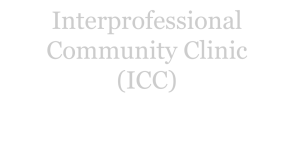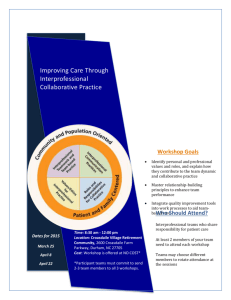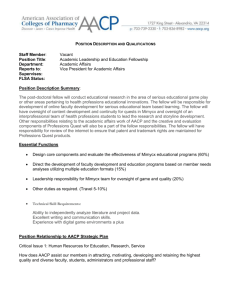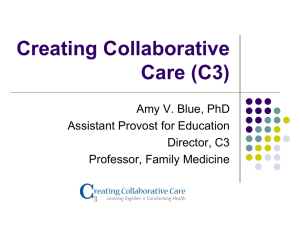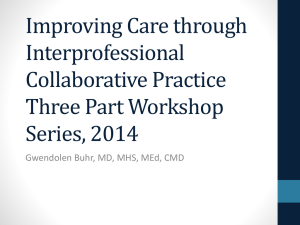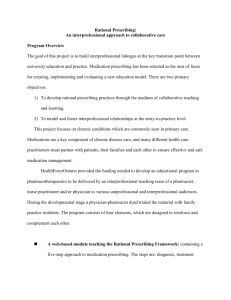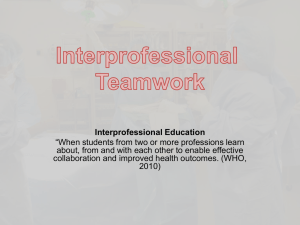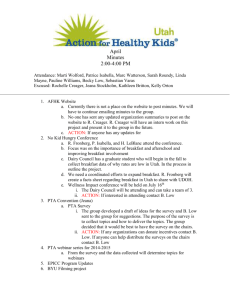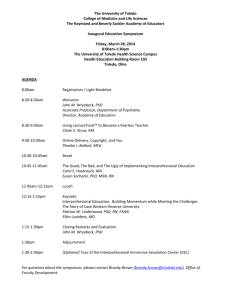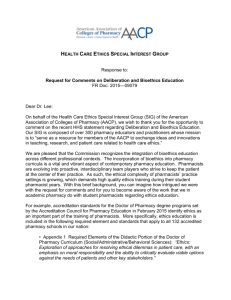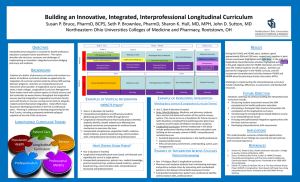AACP Interprofessional Advanced Practice
advertisement
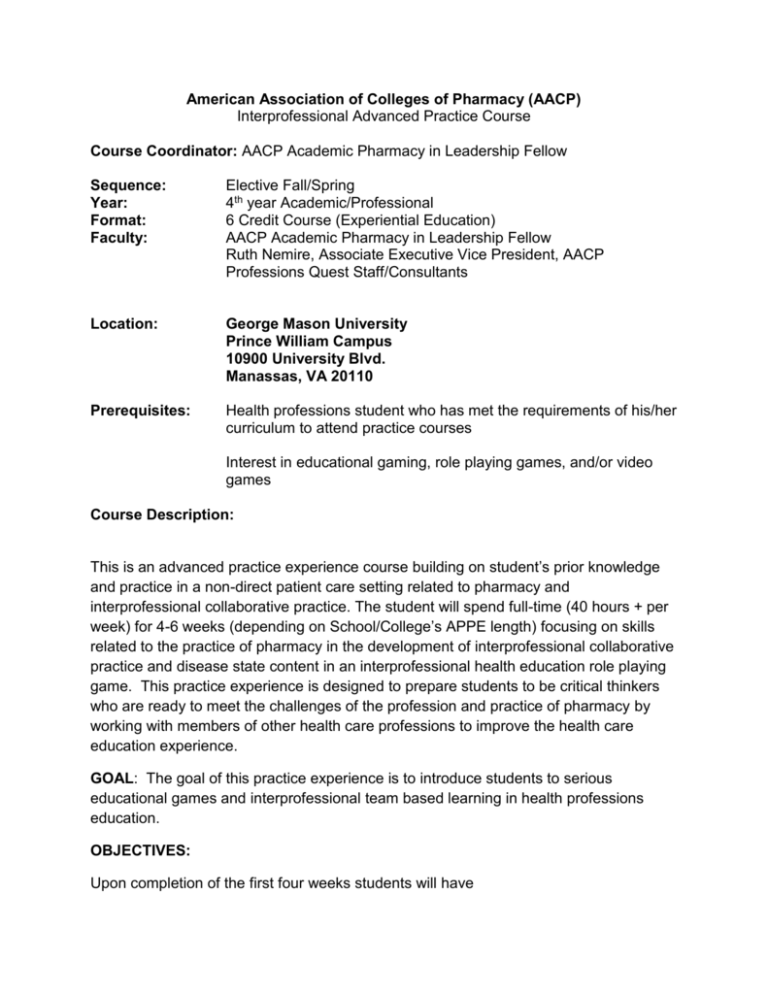
American Association of Colleges of Pharmacy (AACP) Interprofessional Advanced Practice Course Course Coordinator: AACP Academic Pharmacy in Leadership Fellow Sequence: Year: Format: Faculty: Elective Fall/Spring 4th year Academic/Professional 6 Credit Course (Experiential Education) AACP Academic Pharmacy in Leadership Fellow Ruth Nemire, Associate Executive Vice President, AACP Professions Quest Staff/Consultants Location: George Mason University Prince William Campus 10900 University Blvd. Manassas, VA 20110 Prerequisites: Health professions student who has met the requirements of his/her curriculum to attend practice courses Interest in educational gaming, role playing games, and/or video games Course Description: This is an advanced practice experience course building on student’s prior knowledge and practice in a non-direct patient care setting related to pharmacy and interprofessional collaborative practice. The student will spend full-time (40 hours + per week) for 4-6 weeks (depending on School/College’s APPE length) focusing on skills related to the practice of pharmacy in the development of interprofessional collaborative practice and disease state content in an interprofessional health education role playing game. This practice experience is designed to prepare students to be critical thinkers who are ready to meet the challenges of the profession and practice of pharmacy by working with members of other health care professions to improve the health care education experience. GOAL: The goal of this practice experience is to introduce students to serious educational games and interprofessional team based learning in health professions education. OBJECTIVES: Upon completion of the first four weeks students will have 1. Worked on an interprofessional team 2. Developed learning content and performance measures for an interprofessional educational game 3. Translated competencies into learning activities for an interprofessional educational game 4. Developed assessments of learning such as peer evaluation and self evaluation rubrics and an overall report of performance into the game Students will also be able to*: 5. Explain the roles and responsibilities of other care providers and how the team works together to provide care. (RR4) 6. Use the full scope of knowledge, skills and abilities of available health care professionals and health care workers to provide care that is safe, timely, efficient, effective and equitable. (RR5) 7. Express one’s knowledge and opinions to team members involved in patient care with confidence, clarity, and respect, working to ensure common understanding of information and treatment and care decisions. (CC3) 8. Listen actively, and encourage ideas and opinions of other team members. (CC4) 9. Engage other health professionals—appropriate to the specific care situation-in shared patient-centered problem solving. (TT3) 10. Apply leadership practices that support collaborative practice and team effectiveness. (TT5) 11. Reflect on individual and team performance for individual, as well as team, performance improvement. (TT8) If applicable, in weeks 5 and 6 students will: 1. Continue with activities above 2. Begin development of new quests within the educational game 3. Conduct research for background information on educational research in gaming 4. Follow up with consultants for content verification and refinement *Competencies from the “Core Competencies for Interprofessional Collaborative Practice” sponsored by the Interprofessional Education Collaborative, May, 2011. ASSIGNMENTS Assignments will be determined based on student interest and project status and will include the following: 1. Midpoint and end of practice experience self-evaluation, preceptor and site evaluations. 2. Written summary of completed project. 3. Oral presentation of completed project. 4. Other assignments as directed by faculty and staff. Topics for projects may include: 1. 2. 3. 4. 5. 6. Disease state research Definition of roles of health care professionals within the game Development of quests for health care professionals Development of evaluation tools for use within the quest Design of the gaming environment Evaluation of roles, quests and gaming environment ASSESSMENT METHODS Preceptor Evaluation (includes evaluation of projects and presentations) 100% COURSE POLICIES 1. The students’ School/College policies concerning student Conduct and Cheating described in their Student Handbook shall apply to this course. Just a reminder: Academic dishonesty will result in a course grade of F. 2. All materials and course activities, including purchasing of texts, and reading assignments are the responsibility of the student. To successfully complete the course, the student will be required to work on assignments outside of the regularly scheduled course hours. 3. Students will be working in a professional environment. As such, professional dress is required. Review your school policy concerning dress code for suggestions regarding appropriate dress. 4. Financial responsibility for transportation, housing, and all other costs of living are the responsibility of the student. There is no stipend or salary associated with the AACP APPE Program. 5. All policies and guidelines of students’ School/College not covered in this syllabus apply.
